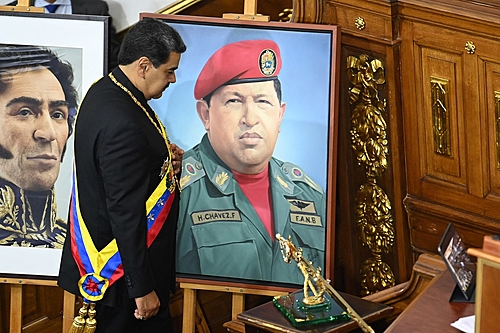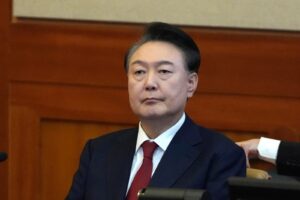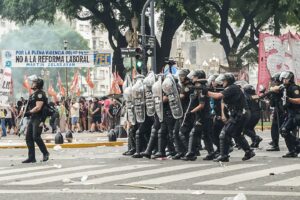
The international conference convened by the government of Colombian President Gustavo Petro to discuss the crisis in Venezuela had an ambitious objective: to reactivate dialogue between the government and the opposition, define an electoral schedule and eliminate sanctions against the neighboring country.
Delegations from 20 countries met last Tuesday (25) in Bogotá, capital of Colombia, to discuss Petro’s proposals. It was the first time that the makers of the sanctions, the US and the European Union, participated in a multilateral meeting to discuss the end of the blockade. Despite this, the results of the summit were modest.
Hours after the end of the meeting, the Chancellor of Colombia, Álvaro Leyva, limited himself to saying that the members had reached “common positions” on the need to define an electoral schedule and eliminate sanctions. However, there was no joint declaration signed by the participants, nor collective announcements to direct the next meeting, which still does not have a date to take place.
Analysts heard by Brazil in fact say there is a complex standoff between Caracas and Washington and that immediate sanctions relief is unlikely. For Steve Ellner, American political scientist and author of several books on Venezuelan politics, the US and its opponents do not seem willing to give in.
“Everything revolves around concessions, whether the concessions will be acceptable to the opposition and whether they will be acceptable to Washington. What is very clear is that the demand that Petro is making and the demand that [o presidente venezuelano] Nicolás Maduro is doing, that all sanctions must be removed, it is unlikely to happen, at least in the short term”, he says.
::What’s happening in Venezuela::
The Americans insist that they would be ready to revise their sanctions policy as Venezuela sets an electoral timetable for the next presidential election, with what they call “fair rules and democratic conditions”. Since 2013, Washington has been questioning the Venezuelan electoral system, reaching the limit of not recognizing the mandate of President Nicolás Maduro when he emerged victorious in the 2018 presidential elections.
After the conference, the US issued a communiqué stating that Bogota envoy Jonathan Finer made clear during the meeting “the vision of a step-by-step US approach, in which concrete actions […] leading to free and fair elections would be met with US sanctions relief”.
The European Union’s High Representative for Foreign Affairs, Josep Borrell, was even more emphatic in saying that the bloc is not willing to immediately lift sanctions. After participating in the conference, he stated that “this window of opportunity will close if in the coming weeks an agreement on the 2024 elections is not reached”.
::Russia will do everything possible to make Venezuela less dependent on the US, says Lavrov in Caracas::
Caracas, in turn, demands that, before any electoral measure, sanctions must be eliminated and, above all, the last agreement signed at the negotiating table in Mexico must be fulfilled by the opposition. In November last year, opponents agreed to release more than US$ 3 billion that belong to the Venezuelan state and that are blocked abroad. So far, the amount has not been released and non-compliance with the agreement has led the government to paralyze the dialogues that have been taking place in Mexico.
“Historically, those who sabotage attempts at dialogue are the opposition”, says José Luis Granados. To the Brazil in factthe Mexican journalist specializing in international law and human rights recalls negotiating tables that failed earlier and claims that Venezuelan opponents have little political autonomy because they got too close to the US and ended up becoming dependent on the US.
::Guaidó lies about invitation to the conference, tries to circumvent migration from Colombia and goes to Miami::
“In the last negotiations of 2018, there was an agreement prepared, the document was already ready and it was practically the same agreement that they are discussing today, with all the conditions that the opposition is demanding: an electoral route, changes in the National Electoral Council, etc. the day the agreement was to be signed, the opposition got up from the table and said it would not participate. And why? Because, at that moment, Washington already had another strategy: the interim period, the recognition of Juan Guaidó and this whole movement that failed “, he states.
Biden has another strategy
Despite continuing hostile actions against Venezuela, Joe Biden’s government adopted a different strategy than that used by Donald Trump. With the former republican president, the White House supported several attempts at coups d’état organized by former deputy Juan Guaidó, whom Washington recognized as the country’s “interim president”.
“Trump’s Venezuela policy was a disaster,” argues Steve Ellner. For the researcher, Biden knew that he should change the diplomatic approach towards the South American country and that this included participating in dialogues on sanctions.
“The fact that the Biden administration is interested in engaging in dialogue and reaching some agreements should come as no surprise, because he knows he has to do something, but that doesn’t necessarily mean he will give in to the administration’s demands. Maduro and eliminate all sanctions,” he says.
::Without Guaidó, what is left for the US and Venezuela to resume relations?::
In 2022, the White House even sent a delegation to Caracas twice to discuss directly with the Maduro government possible relief in the blockade, mainly in measures related to the oil industry, as the US and Europe are experiencing a fuel supply crisis caused by the war in Ukraine.
At the end of last year, Washington allowed the energy giant Chevron to return to operating in Venezuelan territory, even though it maintained a series of financial limitations on the company to make payments to Venezuela’s state oil company, PDVSA, difficult.
::Lula’s special advisor Celso Amorim visits Venezuela and meets with Maduro::
José Luis Granados argues that the measures adopted by the US cannot be considered relief from the blockade, since legally no sanctions have been lifted. “It is a lie to say that there was sanctions relief, they just published very specific licenses that allow oil exploration and export. These licenses are designed to deny direct resources to the government and that is not sanctions relief,” he says.
Elections in 2023 or 2024?
With the impasse between Caracas and Washington over the suspension of sanctions before or after the elections, the definition of a date for holding the election has become an essential issue in the Venezuelan political debate.
Constitutionally, the country should go to the polls in 2024, but members of the government and President Nicolás Maduro himself have already considered an anticipation for this year. The opposition, for its part, has already set October 22 for primary elections, which seek to elect a single candidate to face Chavismo.
However, this sector of the Venezuelan right arrives very worn out in a possible campaign scenario, both because of the failure of Guaidó’s “interim” strategy and because of the scandals involving his political group.
::Businessmen and opposition politicians ask the US to end sanctions against Venezuela::
“The revelations about corruption within this parallel government were not only denounced by chavismo, but also by important opposition figures. Guaidó and his group are completely discredited”, argues Ellner.
Granados, however, believes that the opposition will be the first to give way in this dispute, since its insurrectionary strategy in recent years has not worked and, therefore, it needs to resort to the electoral path to plan a possible triumph over Chavismo.
“They already have a long history of trying to break the constitutional order, but now they will have to give in and accept that, one way or another, elections will take place and they will have to participate. Now, if that means there will be sanctions elimination before the election, I highly doubt it,” she says.
Editing: Thales Schmidt
Source: www.brasildefato.com.br

